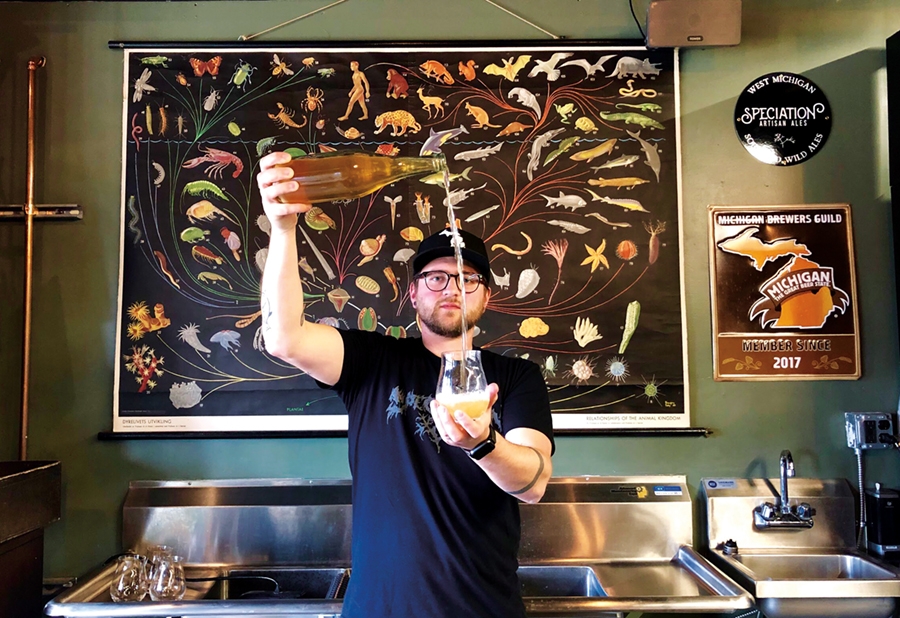I’m up north, bopping about a peninsular wine trail, when I find my schnozz inside another tasting glass, sniffing the day’s fifth Merlot. The menu proposes such scents as “bramble jam” and “tanned leather.”
At this point, it sort of smells like the last five I smelled. I pop a couple oyster crackers and sigh. I don’t mean to put our state’s vintners on blast — the wine tasted fantastic, as did all the others — but after an afternoon laying my palate to waste on grapes, the consistency treads a fine line between impressive and passé.
To combat this kind of homogeny, Mitch Ermatinger, owner of Speciation Artisan Ales, has opened Native Species, a wine label that blasts expectations of what fermented grapes can taste like. During a visit to learn more about the undertaking, Ermatinger places a bottle of unlabeled liquid between us. Yeast swirls throughout like a freshly sneezed galaxy. Something’s fishy. Tinged an orange hue, it looks like Tony the Tiger’s sweat and smells like old-world gueuze. The nose preps the mouth to pucker, and while a low pH nibbles, the oakiness and tannic structure taste like dry white. It’s lively, expressive and altogether awesome — an olive branch between wine and beer camps. It should take off like gangbusters.
In Europe, it already has. On a trip to Amsterdam last summer, Ermatinger circulated through the wine bar scene and spotted this sort of stuff everywhere.
“As soon as I split my first bottle, I knew I had to make it,” Ermatinger said.
In the states, natural wine is a small voice taking up little market share. This could have to do with the name being a contentious label — what’s “unnatural” wine, and why would anyone want to drink that?
“The term (natural wine) reminds me a lot of how sour beer was five to 10 years ago. Like Wild West,” Ermatinger said. “You read five different articles on biodynamic wines and you’ll get five different answers on what it is.”
While the definition among producers remains slippery, there are tenets that separate natural wine from its competition, namely the minimal intervention of chemicals — sulfites, especially — and the promotion of biodiversity. Flavor-wise, expect funk.
“There’s our wild culture floating around everywhere. It's bound to get in the wine,” Ermatinger said.
Picture Welch’s throwing a barnyard bash.
“Nothing overpowering, they tend toward the fruiter side like overripe pineapple and mango,” he said.
That said, trying to pin these distinguishing qualities feels counterintuitive; a large part of natural wine’s appeals is its ‘je ne sais quoi’ — its terroir incarnate, encapsulating the totality of time and place.
Native Species plants its foot firmly in this ideology, quite literally.
“We get our grapes whole, not crushed or juiced,” Ermatinger said. “We bring them back here, roll up our pants, and crush the grapes by foot.”
It brings to mind a scene of Dionysian reverie: satyrs cavorting with their pan flutes, a demigod’s cuppeth running over. The truth is less glamorous.
“Generally, our feet get super cold because they’re harvesting in early morning,” Ermatinger said. “Sometimes the stems are a little pokey.”
A majority of this harvest comes from Domaine Berrien Cellars, a vineyard in Berrien Springs, whose location provides a goldilocks zone for Michigan grapes to flourish. Rather than succumb to big box grapes like Chardonnay or Merlot, Native Species embraces unsung varieties like Vignoles and Frontenac. It’s a wise play that differentiates Native Species from familiar brands while establishing roots in our state’s agriculture.
“The idea is that we’re not making wine for wine people,” Ermatinger said. “Because of that, we don’t really care too much what the rest of the wine world thinks. It allows us to do things way out of the ordinary.”
That includes dry-hopped wine, wine inoculated with brettanomyces, and even some insane barrel experiments, such as a red currently aging in tequila barrels. Ermatinger said it’s one of the “craziest things” he’s ever tasted.
A sommelier might balk at Ermatinger’s orange wine, which defies any neat, categorical boxes. True, wine has an unmatched heritage built on centuries of world-class beverage, but when does history begin to impede innovation?
“Hopefully that changes, because there’s a ton of potential for wine as far as new flavors go,” Ermatinger said. “Everybody’s so orthodox about it that it’s kind of held wineries back. Brewers are more willing to go out on a limb.”
There’s a guiding principle of risk that seems to fuel Ermatinger. Native Species shares this dogma with Speciation. Look no further than the Laurentian beer series, which relies on the breeze of our Great Lakes to impart flora during open fermentation. It results in beer that’s spontaneous and alive, a beautiful idea, bottling the identity of our freshwater source. While some barrels get dumped due to rogue microbes, the ones that survive are magical.
Native Species mirrors that romanticism, blazing into uncharted territory with fingers crossed. There’s a trust in the vine. Leave fruit to its own devices and it will speak for itself.





